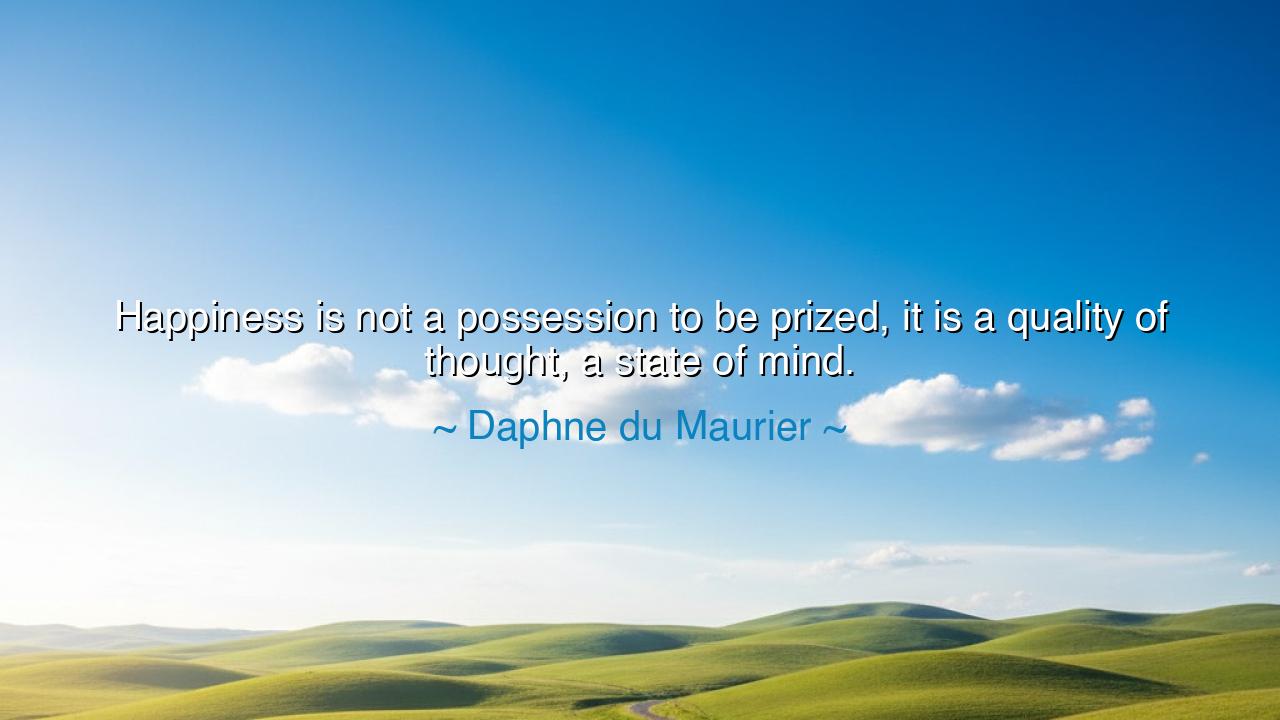
Happiness is not a possession to be prized, it is a quality of
Happiness is not a possession to be prized, it is a quality of thought, a state of mind.






“Happiness is not a possession to be prized, it is a quality of thought, a state of mind.” Thus spoke Daphne du Maurier, the teller of haunted tales and subtle truths, whose words pierce through illusion to touch the soul’s hidden wisdom. In this reflection, she reminds us that happiness is not a treasure to be gathered and stored, nor a prize to be won by the fortunate. It is not a jewel to adorn the proud, nor a trophy for those who conquer the world. Rather, it is an inner condition, a quiet harmony of the spirit, born not of circumstance but of thought—of the way one perceives and responds to life.
In the manner of the ancients, we may say: happiness belongs not to kings or beggars, but to those who have mastered their minds. The one who seeks it in gold or glory will wander endlessly, for possessions are fleeting and the world is ever-changing. But the one who learns to dwell in gratitude, contentment, and peace of heart discovers that happiness was never outside, but always within. Du Maurier’s words, spoken from a life of observation and solitude, echo the wisdom of philosophers long before her—of Stoics and sages who taught that the mind, rightly ordered, is the true kingdom of joy.
The origin of this insight lies both in du Maurier’s nature and in her art. Her life, though adorned with success, was not untouched by loneliness and uncertainty. She knew the shifting tides of fame, the passing of beauty, and the fragile illusions of possession. Through her novels, she explored the restless human heart, forever reaching outward for what can only be found inward. In speaking these words, she does not deny the sweetness of life’s blessings, but rather teaches that their true value depends on the state of mind with which we receive them. For the same dawn that delights one soul may leave another indifferent, and the same fortune that enriches one may destroy another. Thus, thought is the alchemy that turns ordinary moments into treasures.
History, too, bears witness to this truth. Consider Epictetus, the philosopher born a slave. Though bound in chains, he declared that no man could imprison his mind. He found in his own heart the freedom and happiness that kings, surrounded by luxury, so often lack. Or think of Helen Keller, who, though deprived of sight and sound, lived in luminous joy because her thoughts were tuned to gratitude and purpose. These lives reveal that external power cannot grant happiness; only inner vision can.
To understand du Maurier’s wisdom, one must see that happiness is not an event, but a practice. It arises when the soul learns to shape its thoughts like a sculptor shaping marble—removing what is rough and false until only truth remains. The mind, when trained toward beauty, compassion, and acceptance, becomes the garden in which joy blossoms naturally. But when left wild and untended, it grows weeds of envy, fear, and desire. The choice lies always with us: to guard the gates of our mind or to surrender them to the tempests of the world.
Let this teaching, then, be a call to self-mastery. If your happiness falters, do not rush to seek it in possessions or praise. Turn instead inward. Ask not, “What do I lack?” but, “What have I forgotten to appreciate?” Cultivate the art of gentle thinking—the habit of seeing beauty in the ordinary, of forgiving swiftly, of being grateful for what is small yet sufficient. For as du Maurier reminds us, happiness is not found by taking more from life, but by giving more of the mind’s light to what is already there.
The lesson is eternal: happiness is a discipline of perception. It is the music the mind plays when it is in tune with the universe. You cannot buy it, nor steal it, nor hold it tightly, for it is a state of flowing awareness. So, my child, guard your thoughts as sacred instruments. Let them dwell on what uplifts and endures. Seek not to possess happiness, but to become it—to carry it as a light wherever you walk, until even the darkest road is illuminated by your own inner sun.






AAdministratorAdministrator
Welcome, honored guests. Please leave a comment, we will respond soon